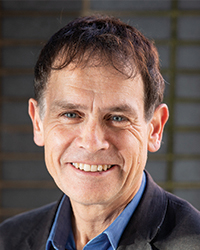Michael Jacobs
 | |
| Born | 3 December 1960 |
| Alma mater | Wadham College (Oxford) |
Michael Jacobs is Professorial Research Fellow at the Sheffield Political Economy Research Institute (SPERI) at the University of Sheffield. He was previously a SPAD to former UK Prime Minister Gordon Brown, Co-Editor of The Political Quarterly and the head of the Fabian Society, and then director of the Commission on Economic Justice at the Institute for Public Policy Research and a visiting professor in the Department of Political Science and School of Public Policy, University College London.[1]
Published work
Michael Jacobs' published work has ranged across environmental and climate change economics, social democratic and green political thought, and a variety of issues in public policy, particularly economic policy. His books include "The Green Economy" (1991), "The Politics of the Real World" (1996), "Paying for Progress" (2000), and "Rethinking Capitalism" (co-edited with Mariana Mazzucato, 2016).
Twelve COP26 tweets
On 10 November 2021, Michael Jacobs tweeted:[2]
Lots of people not professionally involved in climate change may be finding it difficult to understand what is going on at COP26. Many of the people here have no idea either! So I have tried to summarise where we are with three days to go. Hope it may be helpful. 🧵/1
The COP (short for ‘conference of the parties’) is the annual @UN climate change conference. This one is critical because under the Paris Climate Agreement every five years countries must strengthen their climate commitments. This is that moment. /2
But under the Paris Agreement countries' commitments aren't negotiated with others. They are made in 'nationally determined contributions' (NDCs). The clue's in the name - every country decides its own actions. And this creates a problem. /3
For when you add up all the countries’ pledges, they don't cut global emissions enough to meet the Paris aspiration of holding global heating to 1.5C above pre-industrial times, or even the weaker goal of 2C. Current NDCs add up to around 2.4C of warming. /4
Here in Glasgow there have been lots of 'sectoral agreements' announced, in fields such as stopping deforestation, phasing out coal, and climate finance for poorer countries. Some of these have been ambitious, others unhelpfully spun as stronger than they actually are. /5
Technically these side agreements are not part of the COP at all, since they are 'coalitions of the willing' rather than agreements among all 196 countries. And it is difficult to know precisely how much they would cut global emissions even if they were fully implemented. /6
But we have now had an authoritative assessment from Climate Action Tracker. This suggests that putting all the long-term 'net zero' and other pledges together under the best possible assumptions that they are fully implemented could put the world on a path to 1.8C of warming. /7
But the 2030 country pledges, which are much firmer and more reliable, still only add up to a 2.4C pathway at best. So what can still be done here to strengthen ambition and 'keep 1.5C alive', as the UK Presidency said was the main aim of COP26? /8
There are two proposals. One is from the Climate Vulnerable Forum, who want an annual voluntary ambition mechanism under which countries (and maybe those side agreements) report every year on what they are doing to raise ambition in some way. This would not be about new NDCs. /9
The other has come from former UN climate chief Christiana Figueres and others. This is for countries to strengthen their current NDCs in 2023 rather than in 2025. Currently, the Paris Agreement requires new NDCs (likely to be for 2035) in 2025. But that is too late for 1.5C. /10
No country or group of countries has yet put the '2023 ratchet' proposal into the negotiations. But it seems it is the only thing the negotiations can do to 'keep 1.5C alive'. At present negotiations are focused on getting more finance for adaptation and loss and damage... /11
... which is the most important demand of the most vulnerable countries. They are suffering from devastating climate change now. But to have any chance of holding the average global temperature rise to 1.5C, COP26 will also have to decide revisit and strengthen the NDCs. /12[3]
References
Wikipedia is not affiliated with Wikispooks. Original page source here